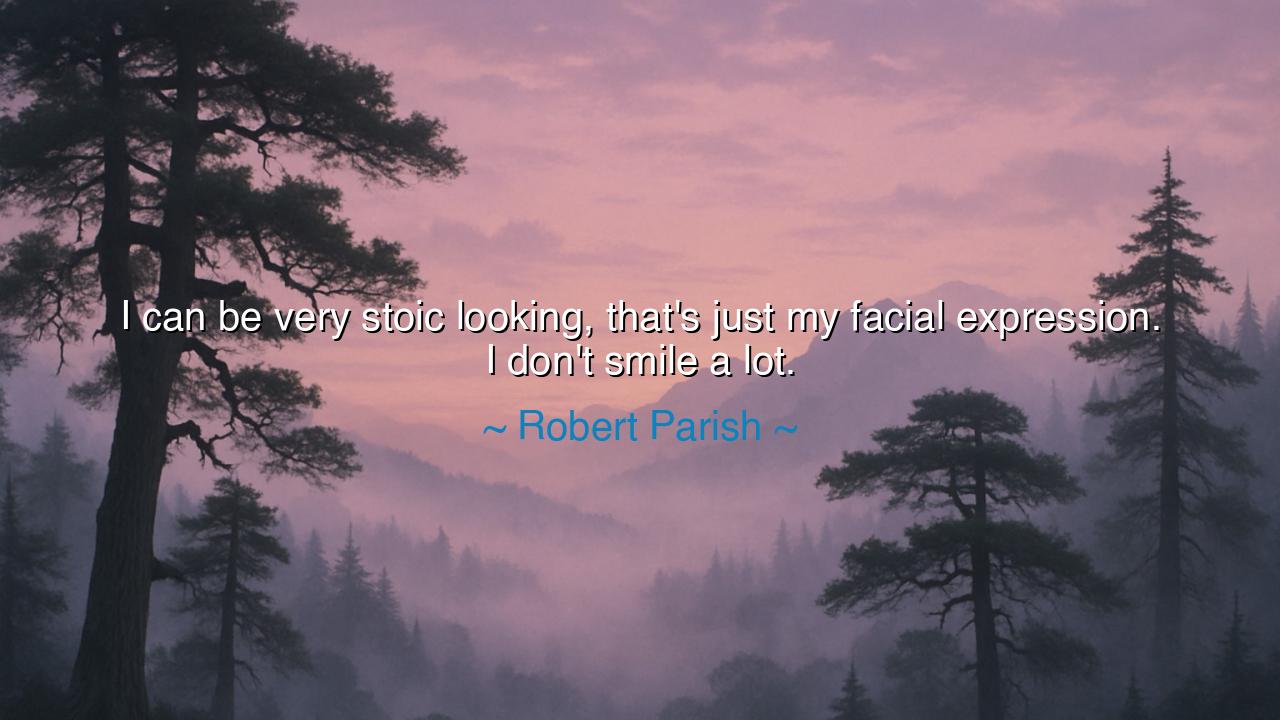
I can be very stoic looking, that's just my facial expression. I






Hear, O seeker of wisdom, the words of Robert Parish, the mighty center of the Boston Celtics, who declared: “I can be very stoic looking, that’s just my facial expression. I don’t smile a lot.” At first, these words may appear simple, a reflection of a man’s countenance, but beneath them lies a deeper truth: that strength often wears the mask of silence, and that the absence of a smile does not mean the absence of feeling. For the ancients taught that a man’s face may be still, yet his spirit may roar like thunder.
The word stoic calls forth memories of the philosophers of old, the followers of Zeno, who preached that a wise man should not be ruled by passion or shaken by fortune, but should remain steady, as a pillar unmoved by storm. Parish, whether knowingly or not, embodies this lineage. His expression, calm and unchanging, was a shield, a reminder that greatness on the court does not come from outward show, but from inward discipline. Thus his lack of smile was not coldness, but constancy—a sign that he was anchored in purpose, not swayed by fleeting waves of emotion.
Consider his place in the history of sport. In the fiery battles of the NBA, where tempers flared and passions burned, Parish stood with quiet power. While others shouted or gestured, he remained composed, his stoic demeanor unsettling rivals who could not read his mind. Yet behind that calm was relentless determination, proven in championships won, rebounds seized, and battles fought in the paint. The lesson is clear: appearances may deceive, for the quiet man may be the strongest of all.
History also tells us of Marcus Aurelius, the Roman emperor who ruled not with laughter or outward show, but with calm reflection. His face bore the lines of burden, not of jest, yet his writings in Meditations continue to inspire generations. Like Parish, Marcus knew that to remain stoic in the face of hardship is itself a form of victory. A smile may charm, but composure sustains. The emperor and the athlete, though divided by centuries, shared the same truth: the truest strength is inward.
Yet we must not mistake this for a rejection of joy. To say “I don’t smile a lot” is not to say “I know no joy.” Rather, it is to declare that joy is carried in silence, expressed not in fleeting gestures but in lasting deeds. For there are many who laugh loudly yet falter in trials, and many who show little outward cheer yet stand firm when others fall. Joy, then, is not measured by the lips but by the heart, and sometimes the most stoic face conceals the deepest well of peace.
The teaching, therefore, is this: do not judge a man by the curve of his mouth, but by the steadfastness of his spirit. Do not assume that those who do not smile are cold, for they may carry within them a furnace of quiet strength. And do not envy those who display constant cheer, for their inner life may not match their outer mask. Learn instead to cultivate your own composure, so that whether you smile or remain still, your heart remains anchored in truth.
And so, beloved, carry this into your own walk. If your nature is expressive, let your joy be genuine. If your nature is stoic, let your stillness be strong. But in either case, let your deeds reveal the light within you, not your expression alone. For as Robert Parish taught through both his words and his life: the face may be calm, the mouth unsmiling, yet the spirit may blaze like a champion’s fire. True greatness does not need to be shown—it only needs to be lived.






AAdministratorAdministrator
Welcome, honored guests. Please leave a comment, we will respond soon